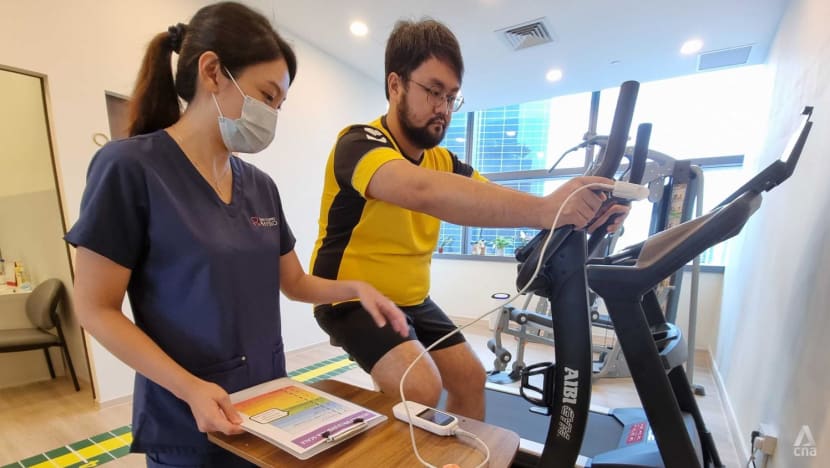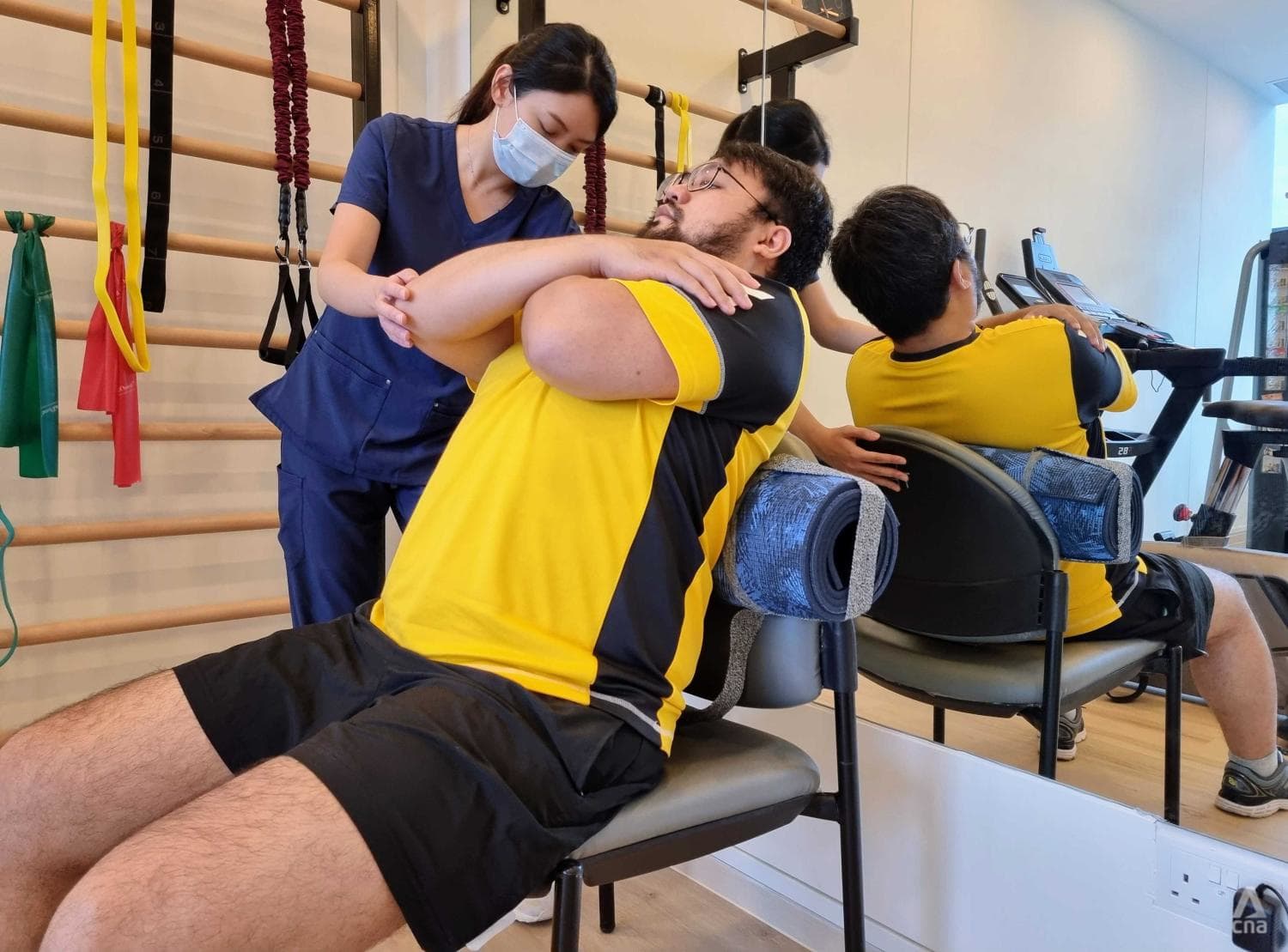www.channelnewsasia.com
Singapore
 Mr Tan Wen Chuan is on an endurance exercise programme to deal with breathlessness after recovering from COVID-19. (Photo: CNA/Chew Hui Min)
Mr Tan Wen Chuan is on an endurance exercise programme to deal with breathlessness after recovering from COVID-19. (Photo: CNA/Chew Hui Min)

23 Mar 2022 12:59PM (Updated: 23 Mar 2022 01:07PM)
SINGAPORE: Ms Doris Ong, 49, has been feeling breathless after walking short distances ever since getting COVID-19 in November.
She used to be able to walk home from the bus stop with two bags of groceries –taking about 10 minutes. But after her coronavirus episode, she once took more than 20 minutes to walk home carrying a coconut, which she was drinking.

Connect, collaborate with ease
She felt so tired that she had to stop to rest a few times, she told CNA. A month ago, she also felt that her heart was “squeezed” while eating laksa, Ms Ong said.
Her symptoms have eased recently, but she still feels “weak” compared to before; and until now, she’s not sought medical advice.
“I feel that it’s still manageable, It's not (as though) I need to go to A&E … if I really cannot (take it), then I will call 995,” she said.
About one in 10 people report some symptoms up to six months after contracting COVID-19, based on data that was published in 2021, said Dr Barnaby Young, head of the Singapore Infectious Disease Clinical Research Network at the National Centre for Infectious Diseases (NCID).

“An important caveat is that it is difficult to determine which of these symptoms were actually due to COVID versus another condition. Breathlessness is a symptom typically reported after a severe infection,” said Dr Young.
“With primary vaccination, boosters and the emergence of the Omicron variant, severe infection and by extension persistent breathlessness post-acute COVID is much less common.”
Ms Jocelyn Ng, who is in her 40s, said that she has become “very sensitive” to any smell or smoke that irritates her throat or airways, setting off a bad, wheezing cough.
She recounted how her hand once “hardened”, swelled and became completely numb after she fell asleep on it.
“I had never felt such excruciating pain before … I was crying,” said Ms Ng. She described how her hand was pulsating, as though her blood was trying to flow but could not.
She went to a doctor, who advised her to go to the hospital. But as there was a large number of COVID-19 cases being treated by the hospitals at the time, she did not go, Ms Ng said.

The painful swelling happens fairly regularly on both hands, so she has been getting a massage every week to deal with this symptom, she said.
She’s also put on weight and feels that she cannot exercise as her “body is very lethargic”.
What was termed “long COVID” has recently been renamed post-acute sequelae of SARS-CoV-2 Infection (PASC), said Dr Edgar Tay, a cardiologist at the Asian Heart & Vascular Centre, Mount Elizabeth Hospital. Sequelae refers to the aftereffects of a prior disease or injury.
The World Health Organization defines this as a condition that occurs in individuals usually three months from the onset of COVID-19, with symptoms that last for at least two months, and cannot be explained by an alternative diagnosis, he said.
Patients who have had at least two vaccine jabs are much less likely to develop post-COVID symptoms, he added.
Dr Adrian Chan, a respiratory specialist from Respiratory Medical Associates, Mount Elizabeth Novena Hospital, said that he has seen more patients with PASC at the clinic daily.
Most report mild upper respiratory tract symptoms and some have more serious signs like breathlessness, wheezing, chest pain and palpitations.
“Fortunately, for most patients, they will recover with time. The goal of medical management is to optimise function and quality of life during the period of symptoms,” he said.

Dr Steve Yang from The Respiratory Practice said that he will do tests to see if there is lung scarring or heart inflammation and to rule out other conditions, such as asthma exacerbation, lung fibrosis or emphysema.
If these are not the cause, then he advises patients to gradually resume exercise and other activities.
“You can expect to have (these symptoms) for the medium to long term, perhaps up to eight months or so. Therefore don't expect to bounce quickly out of this,” said Dr Yang.
“If you do recover quicker then that is good news. It's basically a gradual increase in activity … do small things, and slowly increase the duration and extent of these activities.”
He has been feeling breathless after walking or light activity since November or more than four months after his bout of COVID-19.
Mr Tan, who had asthma as a child, said it can feel like an asthma attack, as he can’t breathe, and he feels like he can’t “fill up” his lungs. This can happen from time to time, even when he’s not active, he said.
He described how he sometimes feels a “knot” in his chest at a particular spot whenever he inhales.
“It's just a constant state of knowing that I have to breathe harder,” he said.
 Mr Tan Wen Chuan does a chest exercise to help him breathe better, with the help of physiotherapist Jaclyn Chow. (Photo: CNA/Chew Hui Min)
Mr Tan Wen Chuan does a chest exercise to help him breathe better, with the help of physiotherapist Jaclyn Chow. (Photo: CNA/Chew Hui Min)
When Mr Tan went to see a general practitioner, he was told that the symptoms would go away in time.
He said: “I felt helpless, because the doctor said there was nothing you can do about it.”
Later, on a friend’s recommendation, he saw a physiotherapist. His therapist, Ms Jaclyn Chow of Heart & Lung Physio, said there are things that can be done to improve one’s breathing and body conditioning while one waits for recovery.
Inactivity, meanwhile, could lead to structural changes like losing muscle mass, which could lead to longer-term issues.
“Even when you (test) negative, there might still be some inflammation, that’s why people have residual symptoms … it also causes sensitivity to the receptors when it detects stimuli like dust, change in temperature or wind blowing on your face,” she said.
This could be why some people have a dry cough even after testing negative for COVID-19. The sensitivity may also cause airways to narrow – resulting in “air hunger”, and can also cause a feeling of not being able to breathe out fully.
Mr Tan has since learned techniques and exercises to help him breathe better, and is on an endurance exercise programme. He’s much more conscious of his breathing and posture, and that has helped him to manage the episodes of breathlessness, he said.
NCID’s Dr Young said that post-acute COVID syndrome is “complex and highly variable”.
“Investigation and treatment is tailored to the individual and the symptoms they are experiencing,” he said.
“Fortunately for the majority, post-acute COVID syndrome is a self-limiting condition and does not require medication. Most will recover with time and a (gradual) return to exercise and other usual activities.”
Lung specialist Dr Yang warned against deliberately trying to catch COVID-19 to “get immunity”, saying that there can be long-term implications after contracting the virus.
He added: “Employees and employers should recognise that this is a problem that we are facing, they are not trying to malinger or trying to find ways to escape work. And I think people should understand when people have all these symptoms.”
Singapore
Breathlessness, fatigue, persistent cough: Doctors see more cases of 'long COVID' in Singapore
Recovered COVID-19 patients have reported a variety of symptoms weeks or months after testing negative for the virus.

23 Mar 2022 12:59PM (Updated: 23 Mar 2022 01:07PM)
SINGAPORE: Ms Doris Ong, 49, has been feeling breathless after walking short distances ever since getting COVID-19 in November.
She used to be able to walk home from the bus stop with two bags of groceries –taking about 10 minutes. But after her coronavirus episode, she once took more than 20 minutes to walk home carrying a coconut, which she was drinking.
Advertisement

Connect, collaborate with ease
She felt so tired that she had to stop to rest a few times, she told CNA. A month ago, she also felt that her heart was “squeezed” while eating laksa, Ms Ong said.
Her symptoms have eased recently, but she still feels “weak” compared to before; and until now, she’s not sought medical advice.
“I feel that it’s still manageable, It's not (as though) I need to go to A&E … if I really cannot (take it), then I will call 995,” she said.
About one in 10 people report some symptoms up to six months after contracting COVID-19, based on data that was published in 2021, said Dr Barnaby Young, head of the Singapore Infectious Disease Clinical Research Network at the National Centre for Infectious Diseases (NCID).

Still feel unwell after testing negative for COVID-19? How to manage post-infection symptoms
NCID’s “long COVID” clinic has been seeing patients with persistent symptoms after COVID who were referred by general practitioners, polyclinics and hospitals, he said.“An important caveat is that it is difficult to determine which of these symptoms were actually due to COVID versus another condition. Breathlessness is a symptom typically reported after a severe infection,” said Dr Young.
“With primary vaccination, boosters and the emergence of the Omicron variant, severe infection and by extension persistent breathlessness post-acute COVID is much less common.”
FATIGUE, COUGH, SWOLLEN HANDS
Recovered COVID-19 patients have reported a variety of symptoms other than breathlessness, including brain fog, fatigue, wheezing, palpitations and persistent coughs. This can last for weeks or months after testing negative for the virus.Ms Jocelyn Ng, who is in her 40s, said that she has become “very sensitive” to any smell or smoke that irritates her throat or airways, setting off a bad, wheezing cough.
She recounted how her hand once “hardened”, swelled and became completely numb after she fell asleep on it.
“I had never felt such excruciating pain before … I was crying,” said Ms Ng. She described how her hand was pulsating, as though her blood was trying to flow but could not.
She went to a doctor, who advised her to go to the hospital. But as there was a large number of COVID-19 cases being treated by the hospitals at the time, she did not go, Ms Ng said.

Commentary: Could you have had COVID-19 and not realised it?
She finds it hard to do housework – when she tried to mop the floor at home, her hand “cramped up and hardened” – so she has hired a part-time helper. And she has trouble buying groceries as her hand “stiffens” when she tries to carry things, said Ms Ng.The painful swelling happens fairly regularly on both hands, so she has been getting a massage every week to deal with this symptom, she said.
She’s also put on weight and feels that she cannot exercise as her “body is very lethargic”.
MORE “LONG COVID” PATIENTS HERE
Medical professionals told CNA that they have been seeing more patients with such symptoms as the number of COVID-19 cases here surged in recent months.What was termed “long COVID” has recently been renamed post-acute sequelae of SARS-CoV-2 Infection (PASC), said Dr Edgar Tay, a cardiologist at the Asian Heart & Vascular Centre, Mount Elizabeth Hospital. Sequelae refers to the aftereffects of a prior disease or injury.
The World Health Organization defines this as a condition that occurs in individuals usually three months from the onset of COVID-19, with symptoms that last for at least two months, and cannot be explained by an alternative diagnosis, he said.
Patients who have had at least two vaccine jabs are much less likely to develop post-COVID symptoms, he added.
Dr Adrian Chan, a respiratory specialist from Respiratory Medical Associates, Mount Elizabeth Novena Hospital, said that he has seen more patients with PASC at the clinic daily.
Most report mild upper respiratory tract symptoms and some have more serious signs like breathlessness, wheezing, chest pain and palpitations.
“Fortunately, for most patients, they will recover with time. The goal of medical management is to optimise function and quality of life during the period of symptoms,” he said.

Nerve damage may explain some cases of long COVID: US study
Doctors advised that patients who have persistent symptoms or develop new or worsening symptoms after recovery from COVID-19 go for a medical evaluation. They should also seek help for symptoms that impact their lives, such as those affecting sleep or limiting exercise.Dr Steve Yang from The Respiratory Practice said that he will do tests to see if there is lung scarring or heart inflammation and to rule out other conditions, such as asthma exacerbation, lung fibrosis or emphysema.
If these are not the cause, then he advises patients to gradually resume exercise and other activities.
“You can expect to have (these symptoms) for the medium to long term, perhaps up to eight months or so. Therefore don't expect to bounce quickly out of this,” said Dr Yang.
“If you do recover quicker then that is good news. It's basically a gradual increase in activity … do small things, and slowly increase the duration and extent of these activities.”
FEELING “HELPLESS”
Mr Tan Wen Chuan, 32, was breathing more heavily than usual after walking for about five minutes from the car park to the interview location.He has been feeling breathless after walking or light activity since November or more than four months after his bout of COVID-19.
Mr Tan, who had asthma as a child, said it can feel like an asthma attack, as he can’t breathe, and he feels like he can’t “fill up” his lungs. This can happen from time to time, even when he’s not active, he said.
He described how he sometimes feels a “knot” in his chest at a particular spot whenever he inhales.
“It's just a constant state of knowing that I have to breathe harder,” he said.

When Mr Tan went to see a general practitioner, he was told that the symptoms would go away in time.
He said: “I felt helpless, because the doctor said there was nothing you can do about it.”
Later, on a friend’s recommendation, he saw a physiotherapist. His therapist, Ms Jaclyn Chow of Heart & Lung Physio, said there are things that can be done to improve one’s breathing and body conditioning while one waits for recovery.
Inactivity, meanwhile, could lead to structural changes like losing muscle mass, which could lead to longer-term issues.
INFLAMMATION, NARROWING AIRWAYS
Ms Chow explained that the SARS-CoV-2 virus “hooks” onto angiotensin-converting enzyme 2 (ACE2) receptors in the body, and these cells are concentrated in the upper airways.“Even when you (test) negative, there might still be some inflammation, that’s why people have residual symptoms … it also causes sensitivity to the receptors when it detects stimuli like dust, change in temperature or wind blowing on your face,” she said.
This could be why some people have a dry cough even after testing negative for COVID-19. The sensitivity may also cause airways to narrow – resulting in “air hunger”, and can also cause a feeling of not being able to breathe out fully.
Mr Tan has since learned techniques and exercises to help him breathe better, and is on an endurance exercise programme. He’s much more conscious of his breathing and posture, and that has helped him to manage the episodes of breathlessness, he said.
NCID’s Dr Young said that post-acute COVID syndrome is “complex and highly variable”.
“Investigation and treatment is tailored to the individual and the symptoms they are experiencing,” he said.
“Fortunately for the majority, post-acute COVID syndrome is a self-limiting condition and does not require medication. Most will recover with time and a (gradual) return to exercise and other usual activities.”
Lung specialist Dr Yang warned against deliberately trying to catch COVID-19 to “get immunity”, saying that there can be long-term implications after contracting the virus.
He added: “Employees and employers should recognise that this is a problem that we are facing, they are not trying to malinger or trying to find ways to escape work. And I think people should understand when people have all these symptoms.”



